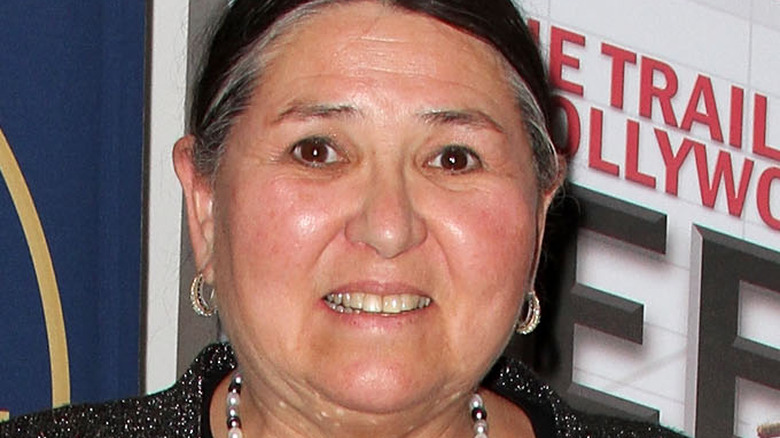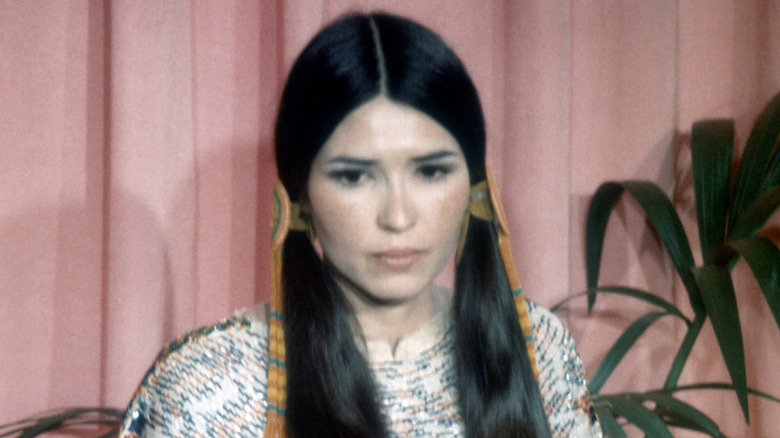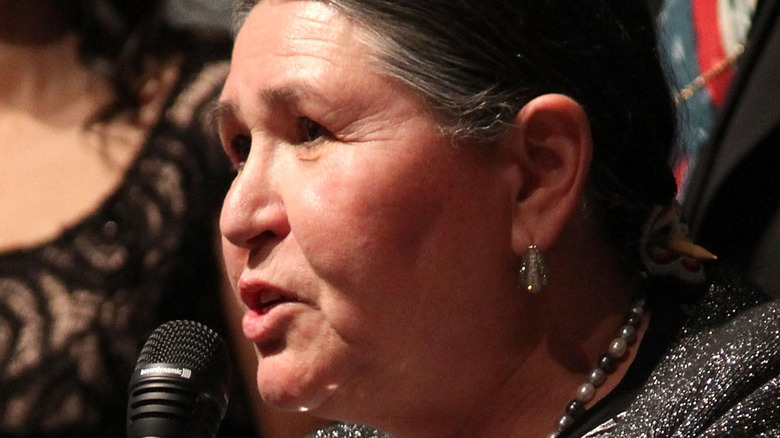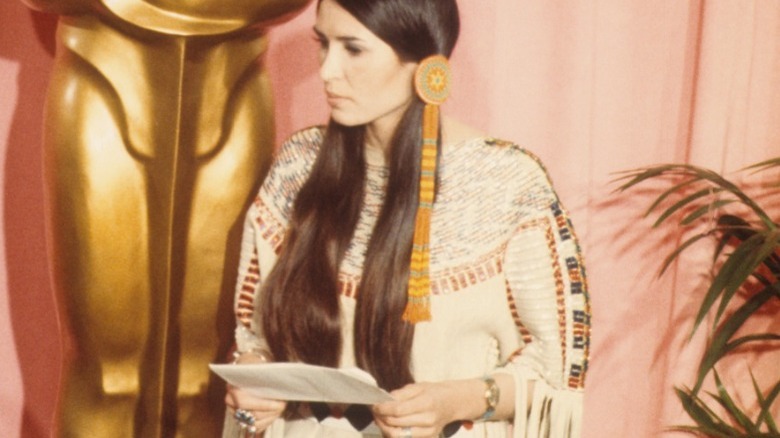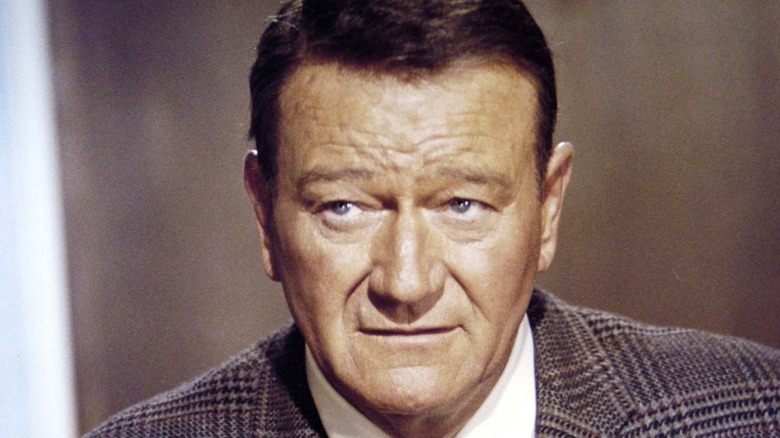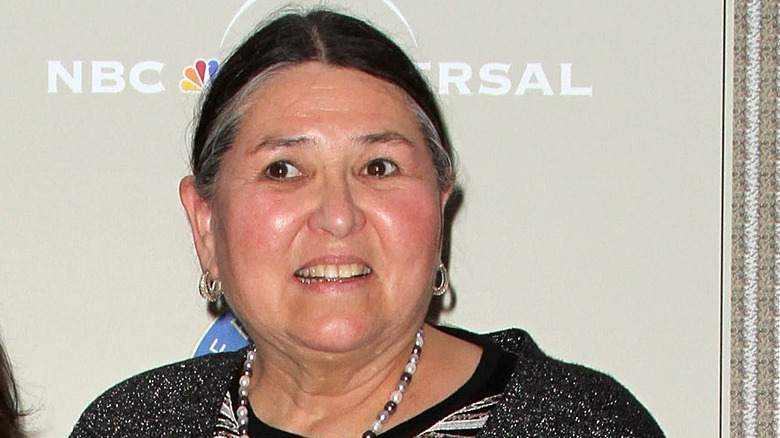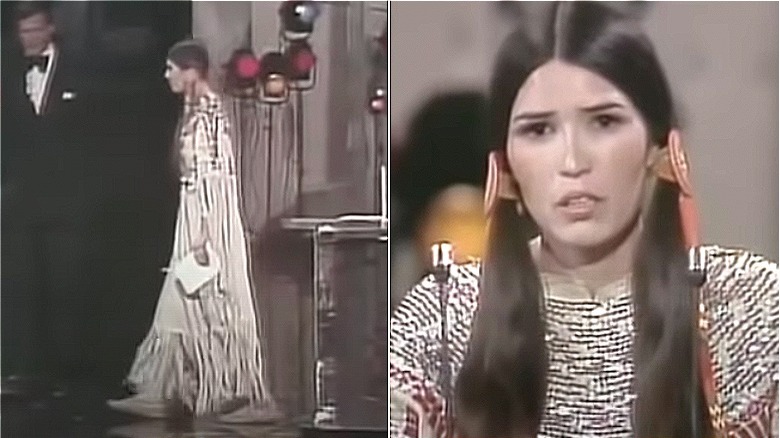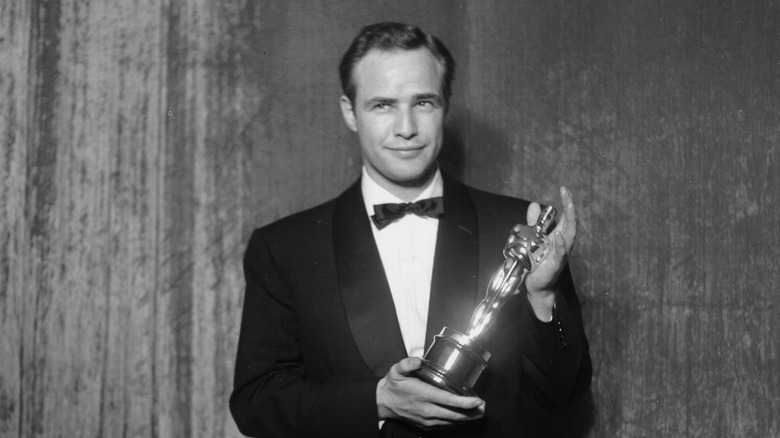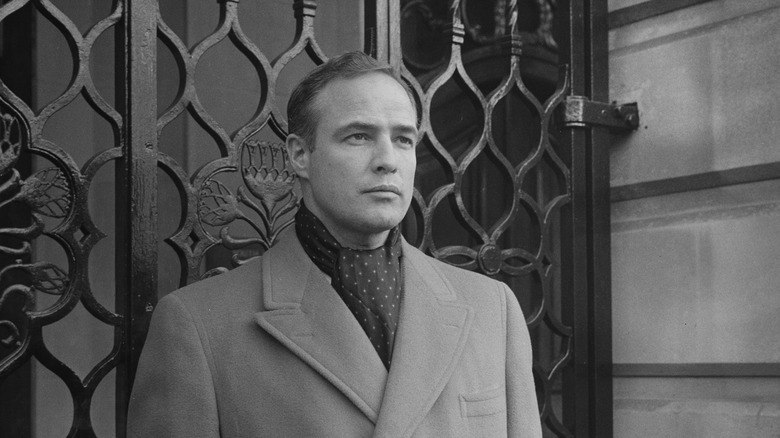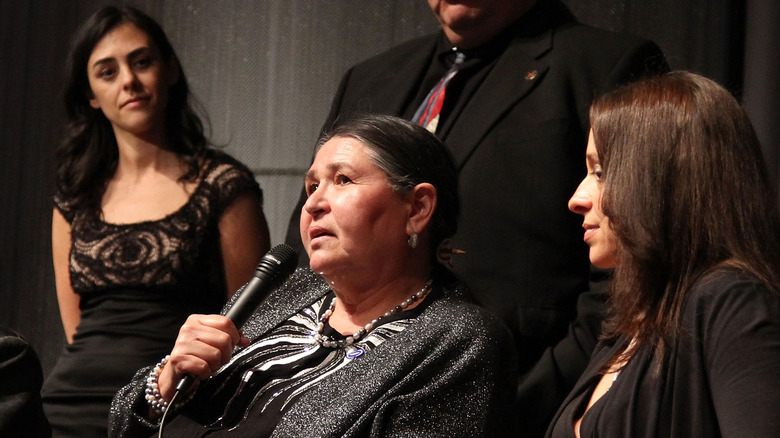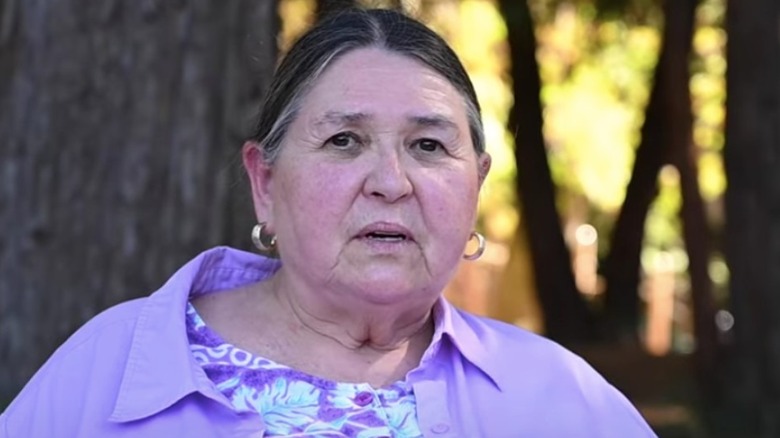The Truth About Sacheen Littlefeather's Oscars Controversy
In what is widely regarded as one of the greatest Hollywood protests of all time, Native American actor Sacheen Littlefeather took to the Oscars stage in 1973 to reject Marlon Brando's award for his crowning classic, "The Godfather." Brando, who boycotted American cinema's biggest awards night, sent Littlefeather to turn down the honor on his behalf. The film that sealed the infallibility of Brando's career simultaneously ended Littlefeather's (via Deadline).
Littlefeather's now-iconic appearance, which included a minute-long speech on justice for Native American communities, evoked attacks against her on a night that racism infamously and blatantly reared its ugly head in Hollywood. Now, almost a half-century after the controversy, the Academy has issued a long-overdue apology to Littlefeather.
Calling the abuse she faced "unwarranted and unjustified," the Academy, in a statement dated June 2022, called for reconciliation with Littlefeather. "You are forever respectfully engrained in our history." A follow-up special event organized by the Academy Museum of Motion Pictures in September of the same year will honor Littlefeather. The actor said she was heartened to see the change that has come to pass in the film industry in the years following her historic stance: "We Indians are very patient people — it's only been 50 years!" she joked (via Independent). Let's take a look back into the past, at the events that led up to and what really transpired on that pivotal Oscars night.
Sacheen Littlefeather was no stranger to racism
Sacheen Littlefeather's childhood was far from easy. Born to a white mother and an Apache-Yaqui father in Salinas, California, Littlefeather was soon packed off to live with her grandparents. "I was a child who was abused and neglected," she told The Guardian, claiming her parents were mentally ill and unable to raise her. " I was taken away from them at age three, suffering from tuberculosis of the lungs," Littlefeather explained. "I lived in an oxygen tent at the hospital, which kept me alive."
She has recalled her father as being an alcoholic around whom she preferred to remain tight-lipped, lest he got violent (via Native Times). Her mother, on the other hand, was more of a "free spirit" hemmed in by domestic violence. "It wasn't a very happy time. I had too much on my mind," she said. During her teens, she also attempted suicide, as she told The Guardian.
On one of her travels with her mother through the South, Littleweather came face to face with some of her earliest encounters with racism. "My mom used one restroom and I had to use the other," she said. As a "mixed race" girl, she was made to use bathrooms and drinking water reserved for Black people in places like Mississippi (via LAist). In school, too, derogatory abuses were hurled at her. At a very young age, Littlefeather was made aware of differential treatment based solely on race: "Not only as an Indian person. But with all people of color" (via LAist). These experiences laid the groundwork for Littlefeather's lifelong tryst with activism that gave voice to the Native American plight.
If you or anyone you know is having suicidal thoughts, please call the National Suicide Prevention Lifeline by dialing 988 or by calling 1-800-273-TALK (8255).
She became an activist for Native American rights
As a young woman, Sacheen Littlefeather balanced life both as an actor and activist. After enduring a childhood of being raised "as a white person," Littlefeather familiarized herself with her tribal culture, engaging with Native protests and community elders (via KQED). "I really had a breakthrough, with other urban Indian people, getting back into our traditions, our heritage," she told The Guardian. She even took part in the agitation at Alcatraz in the early 1970s and began visiting the San Francisco Indian Center (via Native Times). Her inclination for the arts as a young girl — which found outlet through poetry — came through in full glory when Littlefeather joined the American Conservatory Theater, which ultimately opened the doors for her in television.
But it wasn't all rosy as a Native woman looking for a break in Hollywood. "The movie industry basically looked like a Clorox factory. I mean, it was so white," Littlefeather told LAist. She told Native Times that she landed roles in Italian films — like "Il consigliori" as they liked her "exotic" appearance.
Following the 1973 Oscars, when work whittled down for Littlefeather, she returned to education for a degree in health, with a focus on Native American medicine. In conjunction with activism, she worked for years as a health advisor to indigenous communities.
She came in contact with Marlon Brando after writing him a letter
Hollywood godfather Marlon Brando was a vocal advocate of Native American rights and representation — not the easiest stand to take, given that the American film industry of the 20th century was reaping big success with Western classic films that heavily stereotyped Native American communities (via Time). It was through his unrelenting participation in the cause of Native Americans that Brando and Sacheen Littlefeather first crossed paths in the early 1970s.
Littlefeather, then a 20-something college student, was one of many Native activists to protest at the Alcatraz Island — a landmark resistance that continued for 18 months, reported The New York Times. Born Marie Cruz, it was at Alcatraz that she got the nickname Sacheen (meaning "little bear" in Navajo), which ultimately stuck (per Native Times). Brando was one of the few Hollywood heavyweights to visit Alcatraz to express solidarity with the activists.
Littlefeather lived in San Francisco, where her neighbor was Brando's friend and "The Godfather" director Francis Ford Coppola, according to The Guardian. Through Coppola, she got Brando's address and posted him a letter: "I wanted to know if he was for real," she said. It took months, but Brando soon made contact with her. When she picked up his call, Littlefeather quipped, "You beat 'Indian time' all to hell," laying the grounds for a friendship that would endure years and together create one of the most unforgettable Oscar moments.
Sacheen Littlefeather refused Brando's Oscar for The Godfather on his behalf
"I'm representing Marlon Brando this evening and he has asked me to tell you ... that he very regretfully cannot accept this very generous award." When Sacheen Littlefeather took to the podium on March 27, 1973 at the Dorothy Chandler Pavilion in Los Angeles during the 45th Academy Awards and said these words, history was written. For one, she became the first-ever Native woman to grace the Oscars stage, as noted by the Academy itself in a statement made almost 50 years after the incident. Secondly, in hindsight, it seems inconceivable to think that Brando would have turned down an award for his seismic role as Vito Corleone in "The Godfather."
When Brando's name was announced for Best Actor by presenters Liv Ullmann and Roger Moore, Littlefeather walked up to the stage amid applause and — in an unprecedented move — gestured to decline the Oscar statuette as the audience fell silent. "I had promised Marlon that I would not touch that statue if he won," she later told The Guardian. While she did not interact with the award, she did take the podium and elaborated on the reasons for Brando's act of protest in her 60-second speech, calling attention to "the treatment of American Indians" by Hollywood and also the Wounded Knee protest of 1973 led by Native Americans. It was reportedly the first time the Oscars platform was used to make a sharp political statement.
Actor John Wayne apparently got violent while listening to Littlefeather's speech
Sacheen Littlefeather risked a lot when she proxied for Marlon Brando at the 1973 Oscars. While her film career subsequently floundered after her speech, she maintains that there were dangers more imminent that night. Western genre veteran John Wayne was in the wings and apparently "attempted to assault" Littlefeather, as the activist told LAist. "He had to be restrained by six security men." The late star, who had become synonymous with cowboy films like "The Searchers," which showed Native Americans as the adversary, didn't take kindly to Littlefeather's speech. He was "furious with Marlon and furious with me," Littlefeather told the BBC in 2020.
But he was not the only actor to react to the speech. Clint Eastwood, Wayne's fellow Western grandmaster, took a jab at Littlefeather when he came on stage to present the Oscar for Best Picture. "I don't know if I should present this award on behalf of all the cowboys shot in all the John Ford westerns over the years," he said (per The Guardian). Brando, in a rare comment about the controversy, said on Dick Cavett's show in 1973 that the response Littlefeather got on Oscars night "distressed" him and that "they should have at least had the courtesy to listen to her. I think she did very well." Following the Academy's apology in 2022, Littlefeather joked that her late husband probably had a talk with Wayne on the other side (via The Hollywood Reporter).
She was heckled and threatened with arrest the night she gave her speech
Hollywood's reaction to Sacheen Littlefeather was less than kind. Aside from being booed when she took the stage, she was reportedly also pummeled with racist language for the speech she delivered on behalf of Marlon Brando. Her minute-long speech was interrupted by jeers from the audience, prompting 26-year-old Littlefeather to stop and say, "Excuse me." Some applause followed; however, backstage, Littlefeather was met with far more hostile feedback.
The Hollywood Reporter noted that some people present that night heckled her, using ululations and offensive signage. Ululation, a sound common among many indigenous communities, has long been a stereotype employed by mainstream cinema to represent Native Americans, per the literary journal Folio. Attendees also reportedly flashed the "tomahawk chop" gesture at Littlefeather (via The Hollywood Reporter). Crystal Echo Hawk, a member of the Pawnee Nation of Oklahoma, told CNN have recognized that this motion is "dehumanizing" to the community.
Littlefeather later revealed that she was also threatened with arrest that fateful Oscars night. Marlon Brando, whom she represented, had penned a lengthy acceptance speech to be read out from the podium, but the show's producer Howard Koch warned Littlefeather to wrap her statement up in one minute, or else she would be arrested and sued. "I saw the police officers waiting in the wings to take me in handcuffs off the stage," she said (via LAist). She was ultimately led away by two security guards (via KQED).
Why Littlefeather attended the Oscars in her traditional buckskin dress
Marlon Brando and Sacheen Littlefeather's legendary 1973 Oscars stratagem came about in a matter of a few hours. While the actor-activist duo had been in touch for some time before the event, Brando asked Littlefeather to attend the ceremony and decline his award for him only a day before the event (via The Wrap). There was little time to put things together — including an outfit. "I am not a person who owns an evening gown. I said, the only thing I have to wear is my powwow dress," Littlefeather told The Globe and Mail. And so, Marlon Brando agreed that's what she should wear.
An Apache and Yaqui woman, Littlefeather donned a traditional fringed buckskin dress and moccasins, tying the whole length of her hair into two ponytails. "[Brando] chose my wardrobe for me," she revealed in an interview with LAist. After her speech, a rumor began spreading that she wasn't actually a Native Indian and had only dressed up to play the part for publicity (per Vogue). Actor John Wayne, who apparently didn't hold back on denouncing Littlefeather, said that Brando should have known better than "taking some little unknown girl and dressing her up" in Native American apparel. According to The Guardian, some critics even suggested that she wasn't who she claimed to be and was of Mexican descent.
The Oscars speech was originally eight pages long
Sacheen Littlefeather took to the stage at the 1973 Oscars carrying an eight-page statement from Marlon Brando. Although Littlefeather was prohibited from reading the statement, she tell the audience that she would be glad to share Brando's "very long speech" with the media after the ceremony. Littleweather hadn't planned to be at the awards show at all and, only a day before the ceremony, hastily flew to Los Angeles on Brando's request. In fact, when Brando pitched his rather radical idea to her, Littlefeather didn't believe him because "he loved to play practical jokes" (via The Globe and Mail).
Brando finished typing his speech at his Mulholland Drive home mere minutes before Littlefeather went on stage, reported The Guardian. The original speech, later republished in full by The New York Times, gave a stirring account of the injustices incurred against Native Americans for 200 years in the United States. "We lied to them, " he wrote. "We cheated them out of their lands. We starved them into signing fraudulent agreements that we called treaties which we never kept." The statement mentioned that Brando would rather lend his efforts to the Wounded Knee protest spearheaded by indigenous peoples than attend the Oscars. The concluding lines read, "Thank you for your kindness and your courtesy to Miss Littlefeather. Thank you and good night."
The Wounded Knee occupation of 1973 was one of the reasons behind Brando's boycott
The mention of the Wounded Knee occupation continues to be one of the most powerful parts of Sacheen Littlefeather's short yet iconic 1973 Oscars speech. She cited it as one of the reasons behind Marlon Brando's refusal of his Best Actor award.
Wounded Knee is a hamlet on the Pine Ridge Indian Reservation in South Dakota and has historically been a site of Native American resistance (via Britannica). The first notable event dates back to 1890, when Indigenous people from the Sioux community were massacred by armed American troops. The second involved an occupation at Wounded Knee led by the American Indian Movement in February 1973, which saw opposition from law enforcement authorities and resulted in multiple casualties (via Native Voices). The protest was underway while the Oscars were being announced that year.
"Marlon Brando was an excellent strategist, and he knew that that year, the Academy Awards would be broadcast via satellite, to millions of people all over the world," Littlefeather told the Los Angeles Times. It would have been an opportune moment to spotlight Wounded Knee, given how the U.S. government had imposed a media blackout on events transpiring at the protest site (per HuffPost). Ever the activist, Brando had long been involved with the Native American cause and committed time away from the cinema to bolster oppressed voices. In the 1960s, for example, he protested alongside Native Americans in Tacoma, Washington for their fishing rights, reported the Seattle Post-Intelligencer.
Sacheen Littlefeather says she was 'blacklisted' by Hollywood after the Oscars
Sacheen Littlefeather's tremendous act of courage in 1973 wasn't without its consequences. Aside from the racist abuse she had to endure, the curtain came down on Littlefeather's acting career. "I was blacklisted — or, you could say, 'redlisted'," she claimed in "Sacheen: Breaking The Silence," a 2021 documentary about the stance she took half a century ago (via Deadline).
The price Littlefeather paid for speaking up against the unfair treatment of Native Americans brought an effective end to her work as a screen artist. The activist-actor told The Hollywood Reporter that the Federal government forbade platforms from allowing her on air. "When I was at the podium in 1973, I stood there alone," she said. A friend whom Littlefeather spoke to in the aftermath of the Oscars scandal said their studio was visited by officers from the FBI. "And they told us that if we would ever hire you, they would shut us down," she was told (via LAist). No less than the FBI director J. Edgar Hoover was involved in imposing a gag on Littlefeather's voice, she told The Guardian. "I couldn't get a job to save my life," she explained.
It wasn't all in vain though. Littlefeather was apparently contacted by the likes of Coretta King, Martin Luther King Jr.'s wife, who told her she was proud of her (via Native Times). Aside from advocacy, Littlefeather managed to secure work in radio.
Littlefeather 'never thought' the Academy would issue an apology
"I never thought I'd live to see the day I would be hearing this, experiencing this," a positively stunned Sacheen Littlefeather said, almost 50 years after she delivered her landmark Oscars protest speech in 1973 (via The Hollywood Reporter). Her surprise stemmed from the formal apology issued to her by the Academy of Motion Picture Arts and Sciences, which hosts the Oscars, recognizing her "powerful statement that continues to remind us of the necessity of respect and the importance of human dignity."
When she underlined the plight of Native American people back in the '70s, Littlefeather was practically booed off stage by an audience comprising the who's who in Hollywood. Come 2022, the premier film organization conveyed in a statement undersigned by its chief David Rubin: "For too long the courage you showed has been unacknowledged. For this, we offer both our deepest apologies and our sincere admiration." The Academy Museum has welcomed Littlefeather to an evening of "conversation, reflection, healing, and celebration" at an event in September 2022, which will feature Native performers and speakers. With Rubin noting that Littlefeather is "forever respectfully engrained in our history," the Academy Awards History gallery has also honored her in their display, right next to legendary actor Sidney Poitier (via THR). "I'm in good company here," Littlefeather remarked.
According to a 2021 interview Littlerfeather gave to The Guardian, the activist is "very, very ill." "I have metastasised breast cancer — terminal — to my right lung," she told the publication. Despite her declining health, Littlefeather will participate in a conversation with producer Bird Runningwater.
